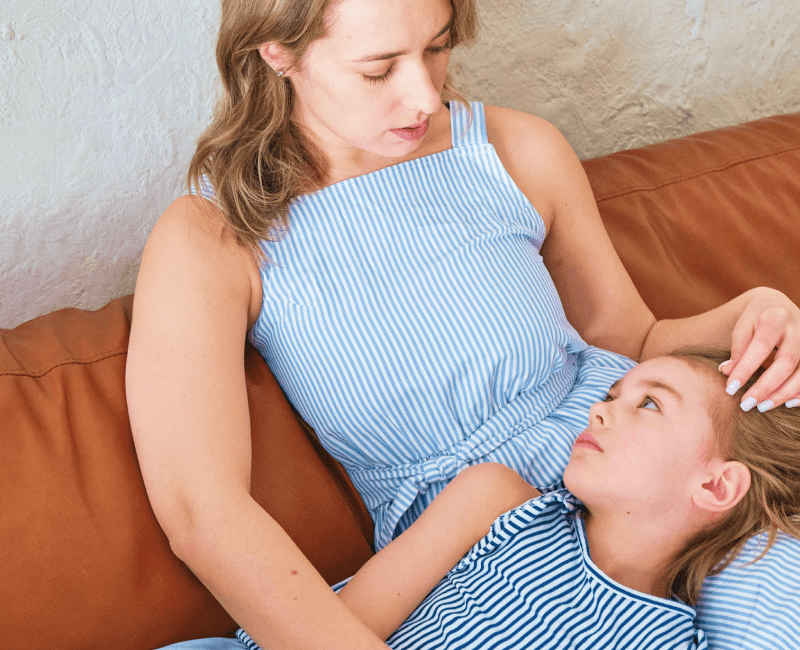Does My Child Have Separation Anxiety?
Intrinsic to our humanity is a need to feel safe, familiar and secure. A child’s earliest attachments are where they find these needs being met and when they know who they can depend on for care. In babies and toddlers you see separation anxiety begin to develop as children are separated from their caregiver and their needs feel threatened . For most children, separation anxiety eases as they get older and they begin to explore the world for themselves. But for many young people, a level of anxiety can persist throughout childhood. As parents we can sometimes feel distressed or guilty about being away from our children whilst knowing this is an inevitable need and part of growing up. So what is separation anxiety and how can we support our children through it?
What is separation anxiety?
Separation anxiety is the worry and fear that results from being apart or the threat of being apart from a primary caregiver. Some children can be more at risk of experiencing separation anxiety such as highly sensitive children, those with attachment disorders or young people who have had previous traumatic experiences of separation. It is also more common for children who have family members with mental health struggles. If your child is showing a combination of the following symptoms it may be that they are experiencing separation anxiety:
- Trouble falling asleep alone
- Nightmares with a theme of separation
- Significant distress or upset when parting from caregiver such as panic, crying or shouting
- Worry about the safety of family or friends
- Resisting or refusing to go to school
- Fear of being alone
- Worry about experiencing an unexpected separation for example being kidnapped or the loss of parent
- Physical complaints of stomach aches, headaches or pain
It’s important when supporting your child with separation anxiety to try to understand what their experience is like and what might be driving it. Try not to dismiss their feelings as clinginess but instead observe what kinds of behaviours they’re showing. Do they experience this anxiety in any situation of separation, or is it just in certain places or with specific people? It’s important to rule out other factors that may be contributing to these feelings such as being bullied, struggling academically or disliking a new teacher. Whatever it may be there are usually other factors contributing to your child’s anxiety and so trying to understand what these are will mean you are better able to support them. It's also important to trust your instincts and those of your child, it may be that they are picking up on something that unsettles them and this may be an indicator that the babysitter or after school club for example isn’t the best one for your child.
How can I support my child with separation anxiety?
1. Communication
Separation anxiety can often be fuelled by uncertainty and a lack of understanding and so communication is an essential part of supporting your child. Children need to be informed about what is happening to them and why. This helps them to have accurate expectations of this new situation and understand why they are being separated from their caregiver. Sometimes we avoid talking about these things with our children in case it distresses them, when in fact more time to talk and understand helps them to familiarise themselves with what’s happening. In an age appropriate way explain to them clearly when, why and for how long the separation will be and when you will be back.
2. Preparation
Alongside communicating clearly and regularly with your child, it’s also important to take time to prepare well for upcoming separations. Help your child to understand what to expect when they’re apart from you, reassure them of the people they can go to if they need support and try to encourage the positive things they will experience in this new place. With younger children you could always role play acting out different scenarios from school for example. This will not only help them to feel more comfortable, but also help you to understand what feelings they might be having. On the day of a separation, try not to rush through the day. Your child will feel better able to manage their emotions if they’ve had time to prepare.
3. Transition
One way to help your child with separation anxiety is to help them transition into those separations. Perhaps you can begin by being present with them in the new place where you can stay at a distance but they know you are there. Once they’ve experienced this new setting they will quickly begin to learn that it is a safe place for them and their anxiety will start to ease. It may be that you then introduce shorter separations where you leave them for a bit longer each time. As they adapt to their surroundings they will begin to develop independence and be curious about exploring their environment to the point where they no longer feel your presence is needed. Try to be consistent as you go through these stages too and keep communicating clearly with them.
4. Comfort
It’s really hard to sit with other people’s pain and distress, especially our children’s and this can sometimes lead us to rush through separations so they are over and done with as quickly as possible. One way you can support your child is to take the time to offer them comfort and reassurance in the moments they are feeling distressed. Acknowledge how they are feeling and that you understand it is upsetting for them. Remind them of why the separation is happening and when you will be back. The more reassurance you can offer your child the better their resilience will be into the future. By offering comfort you are showing them you understand how they are feeling and easing their feelings of distress which in turn makes the separation process feel more manageable.
5. Quality time
The final way you can support your child with separation anxiety is to carve out dedicated time in your days and weeks for quality time with your child. Try to avoid over-scheduling your week with lots of extracurricular activities or social events. Whilst these are both wonderful opportunities for your child, too many can sometimes mean your child has less quality time with you. The pressures of life can be difficult as you manage childcare and work commitments but having some time each week, or every day to spend with your child is the best support you can give. Take time to play with them, talk to them, hear about their interests and passions with your undivided attention.
As you seek to love and support your child through their separation anxiety, remember that this is only temporary and will pass. Try to follow their timing as they gradually become more and more comfortable being apart from you and do reach out for more support if you feel you or your child would benefit from it.
If you know a child who could benefit from our counselling service, why not get in touch.
- General mental health (32)
- Counselling (25)
- Anxiety (11)
- Generalised anxiety (10)
- Depression (7)
- Anger (4)
- Relationship Issues (4)
- Self-Harm (4)
- Suicidal Thoughts (4)
- Autism (3)
- Classroom Behaviour (3)
- Eating Disorders (3)
- Eating Issues (3)
- Loss (3)
- Phobias (3)
- Safeguarding (3)
- School Issues (3)
- LGBTQ+ (2)
- SEMH (2)
- SENCOs (2)
- Secondary & Sixth Form Schools (2)
- AAC (1)
- Absenteeism (1)
- Autism Support (1)
- Looked After/Adopted (1)
- OCD (1)
- Primary Schools (1)
- Social Communication (1)
- Trauma (1)
You may also like
These related stories

How do I get my child to talk to me?

3 ways to start a conversation with your child about mental health
